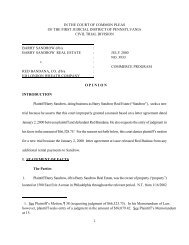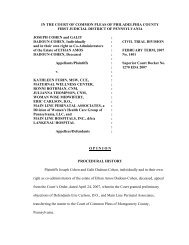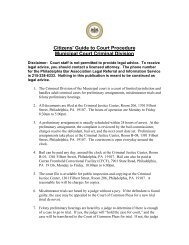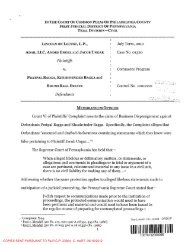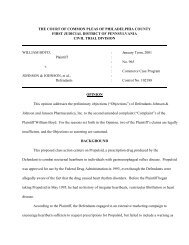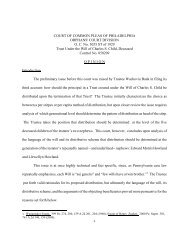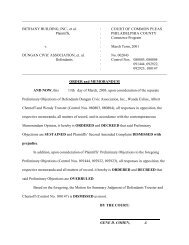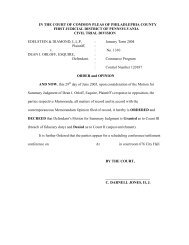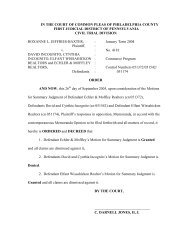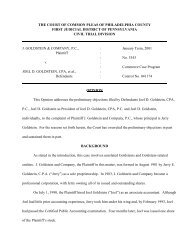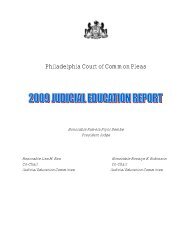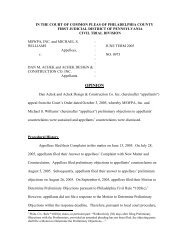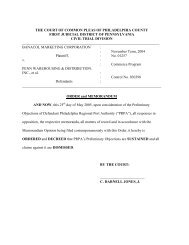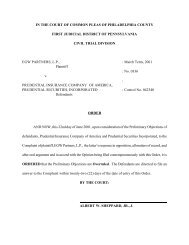EASTERN AMERICA TRANSPORT & WAREHOUSING, INC, and ...
EASTERN AMERICA TRANSPORT & WAREHOUSING, INC, and ...
EASTERN AMERICA TRANSPORT & WAREHOUSING, INC, and ...
You also want an ePaper? Increase the reach of your titles
YUMPU automatically turns print PDFs into web optimized ePapers that Google loves.
THE COURT OF COMMON PLEAS OF PHILADELPHIA COUNTY<br />
FIRST JUDICIAL DISTRICT OF PENNSYLVANIA<br />
CIVIL TRIAL DIVISION<br />
______________________________________________________________________________<br />
<strong>EASTERN</strong> <strong>AMERICA</strong> :<br />
<strong>TRANSPORT</strong> & <strong>WAREHOUSING</strong>, <strong>INC</strong>, : July Term, 2001<br />
<strong>and</strong> DAVID C. WENGER, :<br />
Plaintiffs, : No. 2187<br />
v. :<br />
: Commerce Program<br />
EVANS CONGER BROUSSARD :<br />
& MCCREA, <strong>INC</strong>., ST. PAUL FIRE : Control No. 071266<br />
& MARINE INSURANCE, CO., <strong>and</strong> :<br />
CONTINENTAL CASUALTY COMPANY, <strong>INC</strong>. :<br />
Defendants. :<br />
______________________________________________________________________________<br />
ORDER<br />
AND NOW, this 31st day of July, 2002, upon consideration of the petition to intervene of<br />
Burns International Security Services Corp. in which certain Goods Owners have joined, the responses<br />
thereto, <strong>and</strong> in accordance with the contemporaneously filed Opinion, it is hereby ORDERED <strong>and</strong><br />
DECREED that the petition to intervene is DENIED.<br />
BY THE COURT:<br />
________________________<br />
JOHN W. HERRON, J.
THE COURT OF COMMON PLEAS OF PHILADELPHIA COUNTY<br />
FIRST JUDICIAL DISTRICT OF PENNSYLVANIA<br />
CIVIL TRIAL DIVISION<br />
______________________________________________________________________________<br />
<strong>EASTERN</strong> <strong>AMERICA</strong> :<br />
<strong>TRANSPORT</strong> & <strong>WAREHOUSING</strong>, <strong>INC</strong>, : July Term, 2001<br />
<strong>and</strong> DAVID C. WENGER, :<br />
Plaintiffs, : No. 2187<br />
v. :<br />
: Commerce Program<br />
EVANS CONGER BROUSSARD :<br />
& MCCREA, <strong>INC</strong>., ST. PAUL FIRE : Control No. 071266<br />
& MARINE INSURANCE, CO., <strong>and</strong> :<br />
CONTINENTAL CASUALTY COMPANY, <strong>INC</strong>. :<br />
Defendants. :<br />
______________________________________________________________________________<br />
OPINION<br />
Presently before this court is a Motion to Intervene by Burns International Securities (“Burns”)<br />
which has been joined in by a number of the goods owners (“Goods Owners”) in related litigation. For<br />
reasons set forth, this court concludes that neither Burns nor Goods Owners are indispensable parties<br />
<strong>and</strong> that they are not entitled to intervene in the declaratory judgment action pending before this court.<br />
BACKGROUND<br />
On May 20, 2000, a fire destroyed a warehouse, owned by Eastern America <strong>and</strong> Wenger.<br />
(“Eastern America”). The fire destroyed the warehouse contents owned by several other companies<br />
(“Goods Owners”). The present matter involves an eighteen count complaint by Eastern America (<strong>and</strong><br />
David Wenger) against its broker <strong>and</strong> its insurance companies for, inter alia, breach of contract relative<br />
to the procurement of insurance coverage for Eastern America’s warehouse.
There is also an underlying action against Eastern America by Goods Owners whose property<br />
was destroyed in the fire. The present petition to intervene has been brought by Goods Owners <strong>and</strong><br />
Burns, a co-defendant of Eastern America in the underlying actions.<br />
DISCUSSION<br />
I. Goods Owners <strong>and</strong> Burns Are Not Indispensable Parties To This Action<br />
As an initial matter, Goods Owners <strong>and</strong> Burns argue that they are indispensable parties to this,<br />
the declaratory judgement action. Under Pennsylvania precedent, failure to join an indispensable party<br />
to a declaratory judgment action deprives a court of subject matter jurisdiction. Vale Chemical Co. v.<br />
Hartford Accident <strong>and</strong> Indemnity Company, 512 Pa. 290, 292, 516 A.2d 684, 685 (1986); Insurance<br />
Co. of Pa. v. Lumberman's Mutual Casualty Co., 405 Pa. 613, 616, 177 A.2d 94, 95 (1962). As the<br />
Vale court explained:<br />
[E]ssential to the adversary system of justice <strong>and</strong> one of the basic requirements of due<br />
process, is the requirement that all interested parties have an opportunity to be heard. Thus<br />
all parties whose interest will necessarily be affected must be present on the record.<br />
Vale, 512 Pa. at 296, 516 A.2d at 688."[T]he basic inquiry in determining whether a party is<br />
indispensable concerns whether justice can be done in the absence of a third party...." CRY, Inc. v.<br />
Mill Service, Inc., 536 Pa. 462, 640 A.2d 372, 375 (1994). The determination of indispensability<br />
involves "at least" the following considerations:<br />
1. Do absent parties have a right or interest related to the claim?<br />
2. If so, what is the nature of that right or interest?<br />
3. Is that right or interest essential to the merits of the issue?<br />
4. Can justice be afforded without violating the due process rights of absent<br />
parties?<br />
2
Centolanza v. Lehigh Valley Dairies, Inc., 540 Pa. 398, 658 A.2d 336, 338- 39 (1995) (quoting CRY,<br />
supra) (quoting Mechanicsburg Area School District v. Kline, 494 Pa. 476, 431 A.2d 953, 956<br />
(1981)).<br />
Unlike in Vale, where the issue was a coverage dispute “between the insured <strong>and</strong> the insurance<br />
carrier” thereby making the tort plaintiff indispensable, here Burns is not an indispensable party to this<br />
action. 512 Pa. at 293 (quoting Pleasant Township v. Erie Insurance Exchange, 348 A.2d 477, 479-<br />
480 (1975)). Eastern America’s Third Amended Complaint contains numerous contract <strong>and</strong> tort claims<br />
against the insurers, Continental <strong>and</strong> St. Paul, <strong>and</strong> broker, ECBM. Although, Burns alleges that it is a<br />
third party beneficiary to the contracts between Eastern America, Continental <strong>and</strong> St. Paul, to date, it<br />
has not pleaded that it has any rights or interests in these contract <strong>and</strong> tort claims.<br />
Rather, Goods Owners <strong>and</strong> Burns argue that they have an interest in Eastern America’s<br />
declaratory judgment claims against these insurers <strong>and</strong> broker. However, this declaratory judgement<br />
action is unrelated to any claims Goods Owners <strong>and</strong> Burns may have as Eastern America does not<br />
seek an interpretation of the insurance policy, or the amount of coverage provided under the coverage.<br />
As ECBM correctly points out, “Eastern America claims that due to the conduct <strong>and</strong> promises of the<br />
defendants’, it is entitled to damages in excess of the $1,000,000 limits for legal liability claims provided<br />
in the St. Paul policy. Even though Eastern America seeks declaration of the defendants’ obligations to<br />
Eastern America, it is not a question of insurance coverage <strong>and</strong> the underlying claimants’ entitlement to<br />
such coverage.” ECBM’s Mem. of Law at II. Therefore, without any rights or interests in these claims,<br />
Goods Owners <strong>and</strong> Burns are not indispensable parties.<br />
3
II. The Requests to Intervene Are Denied<br />
Having determined that this court has subject matter jurisdiction, as all necessary parties have<br />
been joined, it now turns to the requests to intervene of Burns <strong>and</strong> Goods Owners. As an initial matter,<br />
both Burns <strong>and</strong> Goods Owners have failed to follow the proper procedure in filing a petition to<br />
intervene. Pa.R.C.P. 2328 states in pertinent part:<br />
(a) Application for leave to intervene shall be made by a petition in the form of <strong>and</strong> verified<br />
in the manner of a plaintiff’s initial pleading in a civil action, setting forth the ground on<br />
which intervention is sought <strong>and</strong> a statement of the relief or the defense which the petitioner<br />
desires to dem<strong>and</strong> or assert. The petitioner shall attach to the petition a copy of any<br />
pleading which the petitioner will file in the action if permitted to intervene or shall state in<br />
the petition that the petitioner adopts by reference in whole or in part certain named<br />
pleadings or parts of pleadings already filed in this action.<br />
By Order of June 21, 2002, this court required that all petitions to intervene be filed on or<br />
before July 15, 2002 <strong>and</strong> set oral argument for July 22, 2002. Only Burns filed such a petition. Both<br />
Burns <strong>and</strong> the Goods Owners appeared for oral argument. Goods Owners argued that their previously<br />
filed motion to consolidate the two separate actions was to be converted into a petition to intervene,<br />
however, any such misunderst<strong>and</strong>ing cannot substitute for a failure to comply with the prerequisites for<br />
filing a petition to intervene. In any event, even assuming Goods Owners joined in Burns’ petition, the<br />
request for intervention fails for the same reasons Burns’ request is denied.<br />
Here, as ECBM correctly points out, Burns has not attached a pleading to its petition that it<br />
intends to file. Moreover, Burns has failed to sufficiently set forth the ground on which intervention is<br />
sought. Although Burns includes in its petition that “[s]ubject to receipt <strong>and</strong> review of all pleadings in<br />
this case, Burns anticipates that it will adopt the well pled averments of Eastern American [sic]” <strong>and</strong><br />
seeks a declaratory judgment, this statement, in <strong>and</strong> of itself, <strong>and</strong> without a pleading, is insufficient to<br />
4
comply with Pa.R.C.P. 2328(a). See Valentino Motors Corp. v. Grillo, 22 Pa. D.& C. 2d 252, (C.P.<br />
Cambria 1960) (holding that a petition is not in compliance with Pa.R.C.P. 2328(a) when the petitioner<br />
merely avers that it “‘will’ adopt as his pleadings the pleadings which are now or ‘will’ be filed by<br />
defendants in the future..”); see also, Keystone Auto Club Casualty Co. v. Sell, 13 Pa. D.& C. 2d 215,<br />
(C.P. Montgomery 1957) (holding that without a pleading attached to the petition, vague conclusions of<br />
law are “insufficient to show that the determination of this action in equity will affect any legally<br />
enforceable interest of the petitioner”).<br />
In addition to procedural deficiencies, Burns’s petition must be denied for substantive reasons.<br />
Pa.R.C.P. 2327 states that a party may be permitted to intervene if:<br />
1. the entry of a judgment in such action or the satisfaction of such<br />
judgment will impose any liability upon such person to indemnify<br />
in whole or in part the party against whom judgement may be<br />
entered; or<br />
2. such person is so situated as to be adversely affected by a<br />
distribution or other disposition of property in the custody of the<br />
court or of an officer thereof; or<br />
3. such person could have joined as an original party in the action or<br />
could have been joined therein; or<br />
4. the determination of such action may affect any legally<br />
enforceable interest of such person whether or not such person<br />
may be bound by a judgment in the action.<br />
Furthermore, Pa.R.C.P. 2329 allows for this court to refuse a petition to intervene if:<br />
1. the claim or defense of the petitioner is not in subordination to<br />
<strong>and</strong> in recognition of the propriety of the action; or<br />
2. the interest of the petitioner is already adequately represented; or<br />
3. the petitioner has unduly delayed in making application for<br />
intervention or the intervention will unduly delay, embarrass or prejudice<br />
the trial or the adjudication of the rights of the parties.<br />
5
Burns claims that it is entitled to intervene under Pa.R.C.P. 2327(4), as it has a “legally<br />
enforceable interest” in the present case. The phrase "legally enforceable interest" has been interpreted<br />
to require that "the applicant for intervention ... own an interest in or a lien upon property in question or<br />
... own a cause of action which will be affected by the action." 8 Goodrich-Amram, St<strong>and</strong>.Pa.Prac. at<br />
373. Here, Burns argues that its legally enforceable interest includes its “clear financial interests in the<br />
amount of insurance.” Pet’s Mem of Law at 5. However, this interest, in <strong>and</strong> of itself, is insufficient to<br />
allow for it to intervene as it is an interest based purely on financial gain. Marion Power Shovel Co, v.<br />
Fort Pitt Steel Casting, 285 Pa. Super. 45, 53 (1981) (holding that although the following language was<br />
deleted from Pa.R.C.P. 2327(4), “the interest justifying intervention must be a right or liability<br />
recognized <strong>and</strong> enforceable at law or in equity as distinguished from an economic motive or interest in<br />
seeing one litigant or another prevail in the proceeding,”the underlying policy behind Pa.R.C.P. 2327(4)<br />
remains <strong>and</strong> supports the finding that a union's financial interest in partially completed castings was not<br />
sufficient to justify its intervention in the replevin action). Therefore, the court concludes that Burns<br />
does not have a legally enforceable interest <strong>and</strong> may not intervene.<br />
In addition, pursuant to Pa.R.C.P. 2329 (2) <strong>and</strong> (3), the court cannot permit Burns to<br />
intervene. First, Burns’s interests are adequately represented in this litigation by Eastern America.<br />
Pa.R.C.P. (2). In the present matter, Eastern America’s interests coincide with Burns’ interests, ie.<br />
recovering money from the insurers <strong>and</strong> broker. Since Burns expects to claim any money recovered<br />
from the insurers, its interests are adequately represented by Eastern America in the present action.<br />
Further, the intervention of both the Goods Owners <strong>and</strong> Burns will undoubtedly unduly delay<br />
the trial, as there are many tort plaintiffs who are involved in the underlying tort action. Pa.R.C.P. (3).<br />
6
Allowing them to intervene would unnecessarily delay <strong>and</strong> complicate discovery. Specifically, as<br />
Eastern America argues, the additional discovery requests “could clearly include the production of<br />
documents otherwise protected... pursuant to the attorney client privilege <strong>and</strong> pursuant to Pa.R.Civ.P.<br />
4003.3.” Pl’s Mem. of Law at 2.<br />
denied.<br />
CONCLUSION<br />
For the reasons discussed, the requests to intervene of both Goods Owners <strong>and</strong> Burns are<br />
Dated: July 31, 2002<br />
7<br />
BY THE COURT:<br />
________________________<br />
JOHN W. HERRON, J.



